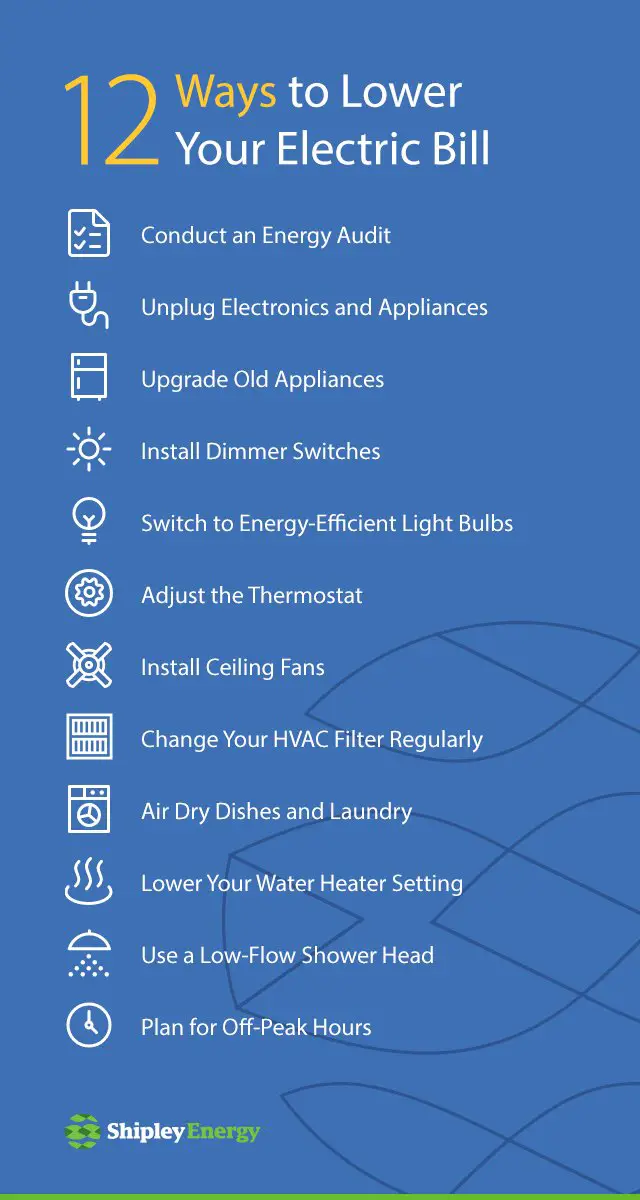Are you tired of getting an electric bill that leaves you feeling powerless? Want to know how to reduce your electric bill without sacrificing comfort or convenience? Well, look no further! In this blog post, we will share some simple yet effective tips to help you take control of your energy usage and reduce your electric bill. By implementing these strategies, you can save money, reduce your environmental footprint, and have peace of mind knowing that every watt counts. So, let’s dive in and learn how to reduce your electric bill starting today!
How to Reduce Your Electric Bill: A Comprehensive Guide
Introduction
Electricity bills can often be a significant monthly expense, but there are plenty of simple and effective ways to reduce your electric bill without compromising on comfort or convenience. By making a few small changes to your daily routine and optimizing your energy usage, you can save money while also contributing to a more sustainable future. In this comprehensive guide, we will explore various strategies and techniques that can help you achieve significant savings on your electric bill.
1. Assess Your Current Energy Usage
Before diving into strategies to reduce your electric bill, it’s important to have a clear understanding of your current energy usage. By assessing your usage patterns, you can identify areas where you can make improvements and set realistic goals for reducing your consumption. Here’s how you can assess your current energy usage:
- Review your past electricity bills to understand your average monthly consumption.
- Take note of any significant changes in your bill and try to identify the factors contributing to those variations.
- Consider using energy monitoring devices or smart meters to track real-time electricity usage.
2. Optimize Your Heating and Cooling
Heating and cooling account for a significant portion of your electricity bill, especially during extreme weather conditions. Here are some tips to optimize your heating and cooling systems:
- Invest in a programmable thermostat to adjust the temperature based on your schedule and preferences.
- Seal air leaks in your home to prevent energy wastage.
- Regularly maintain your HVAC system, including cleaning or replacing air filters.
- Utilize natural ventilation and ceiling fans instead of relying solely on air conditioning.
3. Upgrade to Energy-Efficient Appliances
Replacing old and inefficient appliances with energy-efficient models can lead to significant savings on your electric bill in the long run. Look for appliances with the ENERGY STAR label, as they are specifically designed to consume less energy without sacrificing performance. Consider upgrading the following appliances:
- Refrigerators: Choose models with adjustable temperature settings and energy-saving features.
- Washing Machines: Opt for front-loading machines that use less water and energy compared to top-loading ones.
- Dishwashers: Look for models with energy-efficient cycles and features like half-load options.
- Lighting: Switch to LED or CFL bulbs, which are more energy-efficient and have a longer lifespan.
4. Practice Smart Lighting and Electrical Usage
Small changes in your lighting and electrical usage habits can have a significant impact on your electric bill. Follow these practices to save energy:
- Turn off lights and unplug electronic devices when they’re not in use.
- Make use of natural light during the day by opening curtains or blinds.
- Use task lighting instead of relying on overhead lights to illuminate specific areas.
- Consider installing motion sensors or timers for outdoor lighting.
- Avoid using standby mode for electronics and turn them off completely.
5. Insulate Your Home
Proper insulation plays a crucial role in reducing energy waste and lowering your electric bill. By improving the insulation in your home, you can maintain a comfortable temperature without overworking your heating or cooling systems. Here are some insulation tips:
- Insulate your attic, walls, and floors to prevent heat transfer.
- Seal gaps around doors, windows, and any other openings to prevent drafts.
- Consider using window treatments like curtains or blinds to control heat gain or loss.
6. Use Energy-Saving Power Strips
Many electronic devices consume energy even when they’re turned off but still plugged in. Energy-saving power strips can help eliminate this “vampire” energy usage by cutting off power to devices completely. Use power strips for devices like computer setups, entertainment systems, and kitchen appliances to reduce standby power consumption.
7. Adjust Your Water Heating
Water heating can be another major contributor to your electric bill. By making a few adjustments to your water heating practices, you can save energy and reduce costs:
- Lower the temperature on your water heater to 120°F (49°C).
- Fix any leaks in faucets or pipes to avoid wastage.
- Consider installing a water-efficient showerhead and faucet aerators.
8. Harness Solar Power
Harnessing solar power can be an excellent long-term solution for reducing your electric bill. While the initial investment in solar panels may seem substantial, the savings over time outweigh the costs. Here’s how you can incorporate solar power:
- Install solar panels on your roof to generate electricity for your home.
- Consider solar water heaters to reduce your reliance on electric water heating.
- Explore community solar programs or solar leasing options if complete ownership is not feasible.
9. Monitor and Adjust Your Habits
Monitoring your energy usage and adjusting your habits accordingly is vital for long-term energy savings. Keep track of your progress and make necessary changes to optimize your consumption. Here are some additional tips:
- Encourage family members to be mindful of energy usage and involve them in energy-saving practices.
- Establish a routine of conducting regular energy audits in your home.
- Consider using energy management systems or smart home technologies to automate energy-saving measures.
- Join energy-saving programs offered by your utility company for additional benefits and incentives.
Reducing your electric bill doesn’t have to be a daunting task. By implementing the strategies and techniques outlined in this comprehensive guide, you can effectively lower your energy consumption and save money in the process. Remember, small changes can add up to significant savings over time. So, start making energy-conscious choices today and enjoy the benefits of a reduced electric bill while contributing to a greener, more sustainable planet.
Feel free to reach out to us if you have any further questions or need additional guidance on reducing your electric bill.
5 Simple Tricks to Lower Your Energy Bill 50% or MORE Guaranteed!
Frequently Asked Questions
Frequently Asked Questions (FAQs)
1. How can I reduce my electric bill?
There are several ways you can reduce your electric bill:
- Unplug electronic devices when not in use.
- Switch to energy-efficient light bulbs.
- Use natural light during the day instead of turning on lights.
- Optimize your home’s insulation to reduce heating and cooling costs.
- Consider using a programmable thermostat to regulate energy usage.
2. Are there any energy-saving tips specifically for appliances?
Absolutely! Here are some energy-saving tips for appliances:
- Use the microwave instead of the oven whenever possible.
- Wash your clothes in cold water.
- Air-dry your clothes instead of using the dryer.
- Set your refrigerator temperature to the recommended level.
- When using the dishwasher, only run full loads.
3. Is it worth investing in energy-saving devices?
Yes, investing in energy-saving devices can be worthwhile in the long run. These devices, such as smart power strips and energy-efficient appliances, can help reduce your electricity consumption and lower your bill over time.
4. How can I minimize energy usage when using heating and cooling systems?
To minimize energy usage when using heating and cooling systems:
- Keep doors and windows properly sealed.
- Set your thermostat to an energy-efficient temperature.
- Use a fan instead of an air conditioner whenever possible.
- Regularly clean or replace air filters to ensure optimal performance.
5. Can solar panels help reduce my electric bill?
Yes, solar panels can significantly help reduce your electric bill. By generating your own renewable energy, you can rely less on traditional electricity sources and potentially even sell excess energy back to the grid.
6. Should I unplug my devices when not in use?
Yes, unplugging devices when not in use can help reduce “phantom” or “standby” energy usage. Even when turned off, electronic devices can still consume small amounts of energy if left plugged in.
7. Does weather-stripping windows and doors really make a difference?
Yes, weather-stripping windows and doors can make a significant difference in reducing energy loss. Properly insulating your home helps prevent drafts, keep the desired temperature indoors, and ultimately lowers your electric bill.
8. Can using power-saving settings on my computer/laptop really save energy?
Absolutely! Using power-saving settings on your computer or laptop can save energy. Features like sleep mode, screen savers, and automatic display brightness adjustments help reduce power consumption when the device is not actively in use.
Final Thoughts
In conclusion, reducing your electric bill can be achieved through simple and practical steps. Start by making your home more energy-efficient by insulating doors and windows, using LED light bulbs, and unplugging electronics when not in use. Opting for energy-saving appliances and adjusting your thermostat can also have a significant impact. Additionally, practicing smart energy habits like using natural light, line-drying your clothes, and turning off lights and fans when leaving a room can further reduce your consumption. By adopting these strategies and being mindful of your energy usage, you can effectively lower your electric bill and contribute to a more sustainable future. So, whether it’s making small changes or implementing larger energy-saving measures, take action now to reduce your electric bill.



